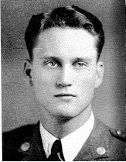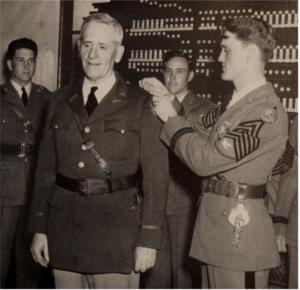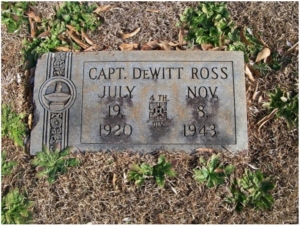Scroll of Honor – D.J. Ross ’41
A Life of Service and Promise
Written by: Kelly Durham
Dewitt Javan Ross was arguably the outstanding member of an outstanding class, the Class of 1941. Its ranks included not only  campus leaders, but also men who would rise to high military rank in the coming World War and those who would go on to great success in business once peace returned.
campus leaders, but also men who would rise to high military rank in the coming World War and those who would go on to great success in business once peace returned.
“De” Ross came to Clemson from West Columbia and majored in textile engineering. An outstanding student, he was selected as a member of the textile engineering honor society Phi Psi, as well as Phi Kappa Phi, the national scholarship honor society. De was awarded the National Textile Association’s bronze medal as a senior. He was recognized by his classmates as a leader, someone who, according to the 1941 Taps, could be counted on to handle problems arising from student activities.
Ross served across campus in a variety of leadership roles, from the Baptist Student Union, where he was elected vice president, to the Senior Council, and the YMCA Council. He was a member of Blue Key and Tiger Brotherhood and served as a Commencement Marshal.
On a campus dominated by military routines, Ross may have shown most brightly in his performance as a cadet.

Cadet Colonel Ross pins silver eagles to the shoulders of Colonel H. M. Pool, Clemson’s military commandant.
As a senior, he was named the commander of Clemson’s Cadet Brigade, with the rank of cadet colonel. He was a member of the Senior Platoon, as one of the best-drilled cadets in his class. He marched with the Pershing Rifles and was tapped for membership in Scabbard and Blade, the military honor society.
Following his graduation, Ross reported for active duty as a second lieutenant in the Army of the United States in September 1941. The war in Europe was threatening to spread into the Western Hemisphere with US Navy destroyers now escorting merchant convoys into the North Atlantic—and facing off against German U-boats.
Ross was assigned to the 8th Infantry Regiment of the 4th Infantry Division. In the fall of 1941, the Army, mindful that war with Germany seemed likely, was engaged in an unprecedented expansion. The 4th Infantry Division participated in the Carolina Maneuvers, large-scale exercises in October. Training continued after the United States was attacked and formally entered the war in December. The division moved to Camp Gordon, Georgia that same month. The summer of 1942 found it back in the Carolinas for another round of maneuvers before relocating to Fort Dix, New Jersey in April 1943. In September, the division was transported to Florida’s Camp Gordon Johnston for amphibious training.
By this time, Captain Ross was serving as the adjutant to Colonel James Van Fleet, commanding officer of the 8th Infantry Regiment. As adjutant, Ross assisted Van Fleet with the regiment’s administrative matters, to include personnel.
On Monday, November 8, 1943, Van Fleet and his staff, including Captain Ross, took a break from their arduous training. The men relaxed at a swimming party at a river near Apalachicola on the coast of the Florida panhandle. During the party, Dewitt Ross drowned, cutting short a life of service and promise.
Dewitt Ross was survived by his parents, sister, and brother, a member of the Naval Reserve then attending the  Medical College of South Carolina. He was buried at the West Columbia Baptist Church. The honorary pall bearers included Dr. Robert Franklin Poole, president of Clemson College.
Medical College of South Carolina. He was buried at the West Columbia Baptist Church. The honorary pall bearers included Dr. Robert Franklin Poole, president of Clemson College.
For more information about Dewitt Javan Ross see:
https://soh.alumni.clemson.edu/scroll/dewitt-javan-ross/
For additional information about Clemson University’s Scroll of Honor visit:
